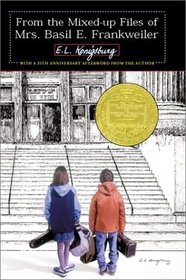I was re-reading this because a young relative had it for an assignment, and I wanted to discuss it with them. In addition to bringing back some fond memories, I really saw it in a very different light than when I was younger. I find that I have a much more ambivalent attitude toward it, when reading it as an adult. I know that it was written in the 1960s, but the idea that two kids could live a week at a museum is far-fetched, at best. If you can indulge in a bit of fantasy, however, it's charming and well worth the read; it's certainly creative, if nothing else, but I hope no one got any ideas from reading it and actually tried it!
It tells the story of two precocious children who run away to a museum, where the oldest, Claudia, becomes obsessed with an "angel" statue which is reported to have been created by Michelangelo. I see the children much less as the "hero" figures I did when I was younger, however, as I consider them much more spoiled and dull kids who are essentially looking for some excitement in life, and to punish their parents because nothing is fair. Claudia, for example, enlists her younger brother, Jamie, to suit her own purposes, in fact, because he's much better at managing money than she is - her sole reason for bringing him alone... that and she is likely too afraid to go it alone. Because, by her own admission, her life is boring and has no meaning or purpose, she doesn't want to run away to any old place, but instead chooses the Metropolitan Museum of Art in New York, just a train ride away from her home in Connecticut.
The twist is that the story is narrated by a curmudgeonly elderly lady, Mrs. Frankweiler, who, we find, is a more central character than initially supposed. She's dictating the letter to her lawyer, who, as it turns out, is significant to the story as well. The end ties all the threads together, but it is noticeably silent on the hell to pay when the children finally make it home, courtesy of a long-suffering chauffeur of the mysterious Mrs. Frankweiler, who is enlisted to drive them. I won't rehash the plot here, or provide any spoilers: I'll just say that the multiple threads, twists and turns keep the story interesting, and I enjoyed re-reading it again, even though I don't think my young relative got as much out of it as I did when I was that age. Perhaps when they're older, they'll see things differently...
It tells the story of two precocious children who run away to a museum, where the oldest, Claudia, becomes obsessed with an "angel" statue which is reported to have been created by Michelangelo. I see the children much less as the "hero" figures I did when I was younger, however, as I consider them much more spoiled and dull kids who are essentially looking for some excitement in life, and to punish their parents because nothing is fair. Claudia, for example, enlists her younger brother, Jamie, to suit her own purposes, in fact, because he's much better at managing money than she is - her sole reason for bringing him alone... that and she is likely too afraid to go it alone. Because, by her own admission, her life is boring and has no meaning or purpose, she doesn't want to run away to any old place, but instead chooses the Metropolitan Museum of Art in New York, just a train ride away from her home in Connecticut.
The twist is that the story is narrated by a curmudgeonly elderly lady, Mrs. Frankweiler, who, we find, is a more central character than initially supposed. She's dictating the letter to her lawyer, who, as it turns out, is significant to the story as well. The end ties all the threads together, but it is noticeably silent on the hell to pay when the children finally make it home, courtesy of a long-suffering chauffeur of the mysterious Mrs. Frankweiler, who is enlisted to drive them. I won't rehash the plot here, or provide any spoilers: I'll just say that the multiple threads, twists and turns keep the story interesting, and I enjoyed re-reading it again, even though I don't think my young relative got as much out of it as I did when I was that age. Perhaps when they're older, they'll see things differently...




![header=[] body=[Get a free book credit right now by joining the club and listing 5 books you have and are willing to share with other members!] Help icon](/images/question.gif?v=52444873)
